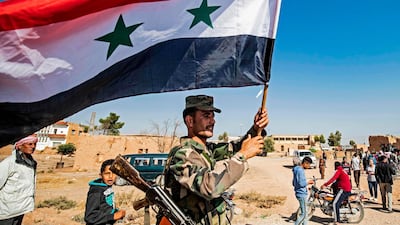For nearly a week, northern Syria has been pounded in a Turkish assault. Abandoned to their fate by the US after it withdrew its troops – effectively giving Turkish President Recep Tayyip Erdogan a free hand to invade – the Kurdish-led Syrian Democratic Forces controlling the region were faced with a difficult choice: keep defending their territory and risk being defeated by the Turks or strike a deal with an oppressive regime. On Sunday, stuck between a rock and a hard place, the SDF came to an agreement with Syrian President Bashar Al Assad, facilitated by Russian mediation, promising to hand over territory in exchange for protection against the Turks.
Ankara is aiming to carve out a chunk of Syria on the border, where it plans to forcibly relocate up to three million refugees. In so doing, Mr Erdogan hopes to fulfil more nefarious purposes: altering the demographics of a predominantly Kurdish area and finishing off the mainly Kurdish fighters whom Ankara considers to be terrorists because they are aligned with the PKK, involved in a decades-long war on Turkish soil. Despite global condemnation, including from the Arab League, Mr Erdogan has continued to bomb civilian areas by land and air. The result has been catastrophic. In less than a week, the casualties are mounting and what basic infrastructure exists is being blown apart. The Syrian Observatory for Human Rights says at least 26 civilians have been killed by Turkish forces and their proxy, the Syrian National Army, while the UN says fighting has forced more than 130,000 Syrians to flee the area – a figure that is likely to triple in the coming days.
In this chaos, at least 750 ISIS members have already managed to flee the camp where they were being held in Ain Issa. So far, it seems Turkey has succeeded in uniting Syrian Kurds and Arabs in opposition and driving them straight into the arms of the Syrian regime, strengthening Mr Al Assad's hold on most of the country. As the US continues to withdraw troops from Syria, all that American troops and the SDF have achieved in the past few years in terms of stabilising the area and defeating ISIS could unravel in a matter of days. There is also the threat of the power vacuum being exploited by malevolent forces, from ISIS sleeper cells to Iranian proxies on the ground, which have been poised and waiting for an opportunity to entrench themselves further.
Although the details of the pact between the SDF and Mr Al Assad have yet to be revealed, it will undoubtedly involve major Kurdish concessions. The regime expects the SDF to surrender the towns of Manbij and Kobane, which were at the heart of the uprisings in the eight-year war. At the peak of ISIS's reign of terror, Manbij was overrun while Kobane withstood a six-month siege by the extremists, before both were eventually freed by the SDF. Both are now set to be delivered into the hands of the regime, with their citizens at the mercy of Mr Al Assad. Kurdish forces had anticipated that they would eventually have to negotiate with the Syrian regime. In their weakened position, fighting for better protection of their rights will be the next battle, while their hopes of autonomy have all but been crushed.
But it is unlikely that the regime will make any concessions to the Kurds. It has refused to do so for years and now that the SDF is under attack and has been abandoned by the US, it is left with little leverage. The world must not stand idle while Syria is invaded and its multiple ethnic factions endure yet more losses.

